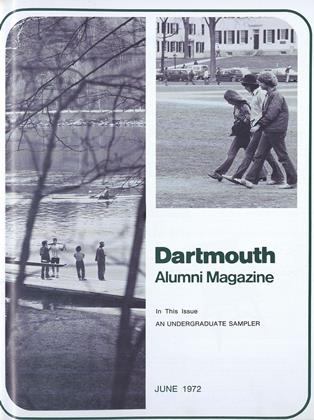THE MAKING OF AN ARAB NATIONALIST: OTTOMANISM AND ARABISM IN THE LIFE AND THOUGHT OF SAT I' AL-HUSRI. "
JUNE 1972 GENE R. GARTHWAITETHE MAKING OF AN ARAB NATIONALIST: OTTOMANISM AND ARABISM IN THE LIFE AND THOUGHT OF SAT I' AL-HUSRI. " GENE R. GARTHWAITE JUNE 1972
By William L.Cleveland '63. Princeton University Press,1971. 205 pp. $8.50.
Arab nationalism, a complex and seemingly always current problem, receives short shrift in American newspapers and periodicals which instead focus upon readily apparent contemporary issues such as national and international politics, personalities, and economic and military problems. Underlying historical factors such as nationalism are largely ignored except in scholarly literature. The biography of Sati' al-Husri by William Cleveland is, therefore, to be welcomed. Not only does this book, written in a clear lucid style, provide us information and analysis of al-Husri's life but places the man and his ideas in their proper historical setting and perspective. Summaries of the background to major historical periods encompassed by al-Husri's long-life, 1880-1968, are provided and thus make this biography readable and illuminating even for the non-specialist. Further, this book is conveniently divided into two sections: the biography proper of Sati' al-Husri and an analysis of his major ideas.
Sati' was born into an Arab family with a record of service to the Ottoman sultan and was himself trained for this service. As a loyal Ottoman bureaucrat he supported the imperial view of Ottomanism and all it implied for the many ethnic groups which comprised this once great empire. Perhaps the most interesting, and indeed Professor Cleveland's most important contribution, is the analysis of the transformation of Sati' al-Husri, the Ottoman public servant and upholder of Ottoman pluralism, to the champion of a revitalized and unified Arab people. Despite a seeming contradiction here, Sati' showed remarkable consistency both in his words and deeds in espousing an Arabism that would cut across national political boundaries and the fragmentation of Arab unity into competing political and national forces, each of which aspires to speak for all Arabs. "I will employ every means to strengthen the feelings of nationalism among the sons of Iraq [where he was reforming the educational system] and to spread a belief in the unity of the Arab nation. And I shall do this without joining any of the political parties which will eventually be formed." (p. 62).
al-Husri was more than a pivotal spokesman for the secular branch of Arab nationalism, for, as a distinguished educator, he left his mark on the schools of modern Turkey, Iraq, Syria, and Egypt. He loyally served, sometimes without honor as in the case of Iraq where he was deprived of his citizenship and deported, the governments of these four countries. Indeed, his life of service guided by principle and a dream of an independent and strong Arab nation epitomized that for which he labored—still an elusive and perhaps unattainable dream for the Arabs.
Dartmouth Assistant Professor of History,Mr. Garthwaite, a specialist in Iran and thehistory of the Bakhtiyari tribes, teaches twocourses in the History of the Near andMiddle East from 1760 to the present.
 View Full Issue
View Full Issue
More From This Issue
-
 Feature
FeatureThe Future of Liberal Arts Education at Dartmouth
June 1972 -
 Feature
FeatureDartmouth Men and the World: Three Views
June 1972 By ALBERT H. CANTRIL '62 I, THOMAS F. BOUDREAU '62 -
 Feature
FeatureRETIRING FACULTY
June 1972 -
 Feature
FeatureWhitman at Dartmouth—100 Years Ago
June 1972 -
 Feature
FeatureUNDERGRADUATE SAMPLER
June 1972 -
 Article
ArticleThe Myth of the Munich Analogy
June 1972 By STEPHEN C. THEOHARIS '71
Books
-
 Books
BooksREVIEWS OF RECENT PUBLICATIONS BY ALUMNI AND FACULTY TORY TAVERN
August 1942 By Allen R. Foley '20 -
 Books
BooksA CENTURY OF GENEALOGICAL PROGRESS
June 1946 By Gertrude B. Wright -
 Books
BooksThe Private Papa
June 1981 By J. D. O'Hara Jr. '53 -
 Books
BooksBriefly Noted
JUNE 1969 By J. H. -
 Books
BooksTHE HARDER THEY FALL,
October 1947 By Joel W. Egerer -
 Books
BooksLE HIBOU ET LA POUSSIQUETTE.
January 1962 By RICHARD W. MORIN '24

